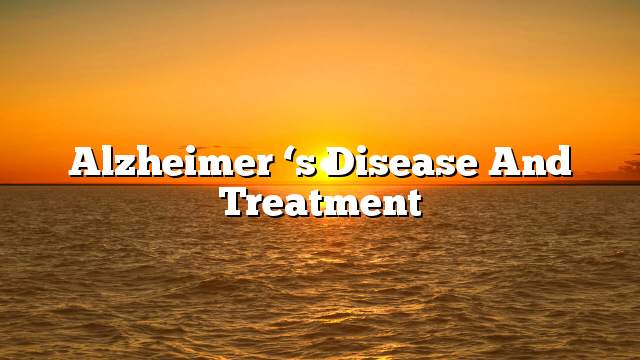Alzheimer’s disease
Alzheimer’s disease is defined as neurodegenerative disease, which is characterized by a person’s impairment of memory, knowledge, cognition, and behavior, which adversely affects the patient’s professional and social life. Alzheimer’s disease is the most common type of dementia, accounting for 60-80% of cases of dementia, and dementia is a general term used to express memory loss and cognitive abilities. Alzheimer’s disease is accompanied by plaques in the hippocampus, part of the brain responsible for coding memory, and Alzheimer’s affects other regions responsible for thinking and decision-making, as well as nodules of proteins in the internal neuron delivery system Microtubules. The effect of Alzheimer’s disease extends to disrupt the processes necessary for the safety of nerve cells, such as communication with other cells, metabolism and repair, and the condition of the patient worsens over time.
Statistics on Alzheimer’s disease
Some WHO statistics suggest that the approximate proportions of Alzheimer’s disease, regardless of the cause, are less than 1% in people aged 60-69 years, but reach about 39% in people older than 90 years. Progress Age is the most serious risk factor for Alzheimer’s disease. Some studies have shown an increase in the incidence of Alzheimer’s disease in females compared to males. It should be noted that the chances of contracting Alzheimer’s disease and other dementia are doubling among African Americans when they are over 71 years of age compared with their white counterparts.
Symptoms and signs of Alzheimer ‘s disease
In fact, symptoms and signs of Alzheimer’s disease do not appear immediately after the parts of the brain are affected by the damage associated with Alzheimer’s disease. Usually, damage occurs in the parts of the brain concerned, decades before the appearance of symptoms and signs. Symptoms and signs can be divided depending on the degree and stage of the disease:
- Simple Alzheimer’s: (Mild Alzheimer disease), the stage in which the clinical diagnosis of Alzheimer’s disease; begins the suffering of the patient from the loss of cognitive abilities, and the symptoms and signs suffered by the injured at this stage include:
- The patient’s confusion and confusion of sites and places familiar to him.
- The patient took longer to do the normal daily tasks.
- Take the patient wrong decisions.
- Patient injury anxiety, personality disorders and mood.
- Patient suffering from fear and panic.
- The inability of the patient to deal with money and pay bills.
- Patient loss of spontaneity and sense of initiative.
- Alzheimer’s Disease: (Moderate Alzheimer Disease) and symptoms and signs associated with this stage:
- Increased memory loss and confusion.
- Low attention span in the patient, as may be difficult to recognize friends and family.
- Facing the patient’s language difficulties, such as reading, writing, and dealing with numbers.
- The inability of the patient to learn new things, and the difficulty in arranging his thoughts and logical thinking.
- Patient suffering from anxiety, hallucinations, delusions, anguish, repetition of some movements or sentences.
- Lack of awareness of the right time and place for doing the acts, such as removing clothes.
- Patient suffering from insomnia, agitation, and frequent crying, especially at night.
- Severe Alzheimer’s: (Severe Alzheimer’s disease). This stage is the most severe stage of Alzheimer’s disease, in which the patient loses the ability to recognize family and friends completely, and becomes fully dependent on others. This often results in the death of the patient, : Aspiration pneumonia), symptoms of this stage as well:
- weight loss.
- Skin infections and nerve spasms.
- Difficulty swallowing.
- Increase sleep hours and spend most of the time in bed.
- Loss of control ability to remove urine and stool.
Treatment of Alzheimer ‘s disease
There is still no treatment for Alzheimer’s disease, but doctors are treating some medications that help to alleviate the symptoms and signs experienced by the injured: such as memory loss and cognitive disorders, as well as medicines may reduce the speed of development and deterioration of the disease. :
- Cholinesterase inhibitors: (Cholinesterase inhibitors). These drugs act in small and moderate cases of Alzheimer’s disease. They increase the level of the neurotransmitter acetylcholine in the brain of Alzheimer’s patients. By giving these drug inhibitors, neurotransmitters may improve, These drugs are used to treat other neuropsychiatric symptoms such as depression and frenzy. The most prominent drugs of this group are Donepezil, Galantamine and Rivastigmine. Diarrhea, nausea, loss of appetite, and sleep problems.
- Medinetin: (Memantine). This drug is used in moderate and severe cases of Alzheimer’s disease, and may be used in simple cases if the use of cholinesterase inhibitors is not possible, as well as may be taken with cholinesterase inhibitors at the same time, and side effects that can cause Headache, high blood pressure, constipation, and general fatigue.
- Antidepressants Antidepressants may be used to treat behavioral symptoms associated with Alzheimer’s disease.
- Change the patient’s lifestyle: Doctors recommend Alzheimer’s patients to make some adjustments to daily life to suit their health. These measures aim to reduce the mental effort that requires the use of memory, and make their lives more orderly and usual, such as keeping their important tasks in one place, and use the calendar to place daily appointments, Billings are automatically scheduled, and people are advised to drink plenty of fluids and be careful to eat high-calorie foods and proteins.
